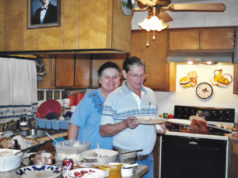Before the “woke mob” (lol!) accuses us of lacking religious diversity and before members of the Mercy Culture Cult think we’ve found Jesus, let me explain. This time of year is full of seasonal celebrations of other faiths and a million different traditions, but when I put out an open call to my writers for their favorite winter customs or memories, all I got was Christmas stuff, which is totally fine — like a lot of folks from my generation or thereabouts (including, possibly, these writers), I was raised Catholic, so I get it. Any memories of Hanukkah or Kwanzaa — or, best of all, Festivus — are more than welcome below. We can’t promise they won’t be surrounded by spiteful trash, but they’re still welcome. Buon Natale, all! — Anthony Mariani
Angel Taxi from the Seven Fishes
For me, every minute after Thanksgiving in the 1970s and early ’80s revolved around our family’s annual trip to Nonna’s for Christmas Eve. On the pastoral urban acreage that she owned with Pup-Pup near the original Pittsburgh Airport, about 45 minutes from our house near downtown, we four kids finally got to see our cousins, an equally untamed herd with whom we mainlined fully leaded Pepsi and played the Ouija board and Monopoly undisturbed for hours — at least until the seven fishes.
An Italian tradition brought over on the banana boat along with my dad’s entire side of the family (like, 200 of them), this feast is basically assorted fish prepared seven ways. The reason has something to do with Jesus or some Italian saint or something. I don’t know. Maybe you can google it for me. Now, Nonna, who remains the all-time champion of the world’s kitchen, often flicked her chin at tradition and went wild (sweet babushka mama!). Baccala in garlic and oil; fried smelt, cod, or flounder; sometimes eel (Pup-Pup’s favorite); sauces with sardines, clams, or langostinos — the house bloomed with the aromas of seafood, herbs, and garlic and rang with the sounds of yell-talking in English and Italian, the Godfather soundtrack, and King of the High C’s (both on eight-track).
My 86-year-old mother has great memories of those meals and her long departed in-laws. Nonna, Mummy said, “used to always cook octopus as well until the day it jumped in the sink while she was cutting it up and cleaning it. She never made octopus after that.”
I still never dined so lavishly. And perhaps never will again.
Unlike in Southern/Texas families, where the under-18 set eats first for some weird, disturbing reason, up north, the heads of the household dig in before everyone else, leaving the kids to fight over the scraps and rightfully so. Always by the time I’d loaded up my plate, Daddy, my uncles, and all the older male relatives were gone from the table. The garage out back had called to them.
A dimly lit retreat, it housed no vehicles, only a long folding table, lots of folding chairs, a beat-up lawnmower, and a full-size fridge from the 1960s or maybe even the ’50s. Surrounded by a small fenced-in garden, a few fig and lemon trees, and some dead grass, the garage was where Daddy and all the other old Mariani goombahs played poker, drank 7-and-7’s and Iron Citys, smoked Luckys and Camels, and yell-talked for hours into the night.
Mummy always said the angels drove us home. Dragging Daddy away from his cards, his 7-and-7’s, his Luckys, and his father, brothers, brothers-in-law, and cousins was nearly impossible, and when we did finally stuff him into the driver’s seat of our black ’77 Coupe de Ville — to make the long, treacherous trek back into town, doubly dangerous if it was snowing, and it almost always was back then — my mother’s furtive prayers to arrive home safely were always answered. I knew we’d be OK because I’d earlier asked the Ouija board, and, under the direction of the presiding spirit, the short, clear-painted fingertips of my older sister Virginia and our cousin Lisa guided the planchette to “Yes.” — A.M.
Ridglea Hills Is Lit
Maybe the six (sometimes seven) Christmas trees I put up every year gives it away, but I love Christmastime. And after all that decorating work is done, the thing I always look forward to during the holiday season is seeing what everyone else has come up with. We fill up to-go mugs of hot chocolate before hooking my Spotify Coolest Christmas Playlist ® up to the car speakers and heading over to Ridglea Hills to search for the best Christmas lights in Fort Worth. The midcentury gem of a neighborhood nestled between Hwy 183 and Camp Bowie does it up right for the season, but the pièce de résistance is the group of homes nestled along Luther Lake, a small body of water located entirely within the confines of the neighborhood.
Cars complete a circuit around the outside of the lake, taking in the festive décor (and swoonworthy architecture) along the way before lining up along a bridge that crosses the lake to check out the decorated boats and choreographed light show, usually synced to a station on your car’s radio. Every year, it seems, these houses present something new and spectacular, not to be missed if you enjoy looking at Christmas lights. (A recent fav: a light show set to the hit song “Blinding Lights,” complete with a lit-up The Weeknd singing along.)
If my Christmas crew and I are still in the spirit, we often head over to the Ryan Place/Fairmount neighborhoods to check out more toned down but still beautiful light displays before popping in to nearby WineHaus for some hot mulled wine to finish out the perfect Christmas evening. — Emmy Smith
Unwrapping Goodness
Growing up in the Mexican family-restaurant business, I’m fully aware of how popular tamales are this time of year. While they indeed represent Hispanic culture, they were considered the sacred food of the gods in the Aztec and Mayan civilizations. Talk about tradition!
My family loves making and unwrapping tamales on Christmas Eve. As a little guy, I remember the excitement of spending every December 24 at my grandmother’s home on South Jennings near Hemphill Street on the Near Southside. It’s a small abode that’s still standing thanks to my Uncle Ray, who stayed there as a handyman after Grandma Josie died more than 20 years ago. Along with Grandpa Manuel Govea, Grandma raised seven boys and two girls and all of us cousins. It was always a full house for the celebration. The Christmas tree was lit, and many presents sat under the bright, twinkling lights.
Everything started a few moments before 12am. The family would meet at St. Mary’s Catholic Church on Magnolia Avenue for midnight mass, and afterward, everyone went back to Grandma’s, where the tamale making lasted until early the next morning. With a wink of sleep, we unwrapped Christmas presents the next day with our bellies full of tamales.
Even though Grandma and Grandpa are gone, my family gathers at my parents’ house or a relative’s home to keep the tradition alive. It’s fun hearing stories about the old days while my aunts help prepare the tamales.
I remember asking my dad why we always make tamales for Christmas. The corn husk signifies unwrapping a gift, he said. Dad and the family didn’t have much money growing up, so unwrapping a tamale is not only symbolic but sneakily utilitarian — they can feed a lot of people inexpensively.
Tamaleros and tamaleras have gotten creative now, filling tamales with different types of meat and other ingredients (including vegetarian). I don’t think tamales will ever go out of style, and the Christmas custom tickles me. When I see friends from different cultures placing orders for tamales this time of year, I smile a wholesome smile. — Juan R. Govea
A Father’s Christmas Wish
Holiday traditions at Chez Brown center on food and the piano. After clearing small mountains of bulgogi and smatterings of American sides, the Brown and Choi clans traditionally gather around my parents’ Boston grand piano. In that smallish studio, my 5-year-old daughter R. enamors kinfolk with freeform dancing while, in past visits, her half-brother A. reminds the fam that the third generation of Brown musicians are no slackers, even if they prefer pop tunes to Beethoven.
It’s been two years since R.’s half-brother A. visited for the holidays. The past 13 months have been an exhausting succession of family court appearances and failed demands for Tarrant County’s 231st District Court to enforce their visitation orders. Throughout the ordeal and due to my reporting, I’ve connected to and met with dozens of parents who have unjustly lost access to their children because Texas family court judges have admitted false allegations as fact, attorneys have bankrupted the otherwise fit and loving parent, or — as is often the case — a bit of both.
Parents like Brooks McKenzie, Bekah Montgomery, Glen Terry, myself, and many others are demanding reforms that will one day ensure that children are never kept from loving and fit parents. The current family court system that allows and even encourages baseless allegations to be admitted as facts is designed to generate revenue for judges, attorneys, and court officials while too frequently placing the interests of children dead last.
Interference with child custody exchanges is another source of anguish for parents during the holidays. Four times this past year, I’ve waited at airports for my son only to realize that my planned precious time with him has been obstructed. Enforcing court-ordered exchanges can easily cost several thousand dollars, and Texas’ judiciary often fails to hold scofflaw parents accountable for engaging in what amounts to parental alienation. A new law allows municipalities to pass an ordinance for fining violators of child exchanges, and I would encourage folks to look up House Bill 939. Fort Worth and Tarrant County need this option that circumvents our greedy family law system.
This Christmas (or whatever holiday tradition you practice), keep the loving parents who are fighting to see their children in your thoughts and prayers. If you have the opportunity to meet one of our elected leaders, tell them that our government has a duty to protect the rights of children to know both their parents. Children are the product of two people, and as long as those moms and dads are involved and loving, no system should diminish their access to their children.
A.’s recent absences reminded our family what a central role his visits and sense of humor played in bringing joy to Chez Brown over the years. For our family, the Nativity story’s message of hope is one that we will reflect on as we once again gather around the piano to celebrate Christmas. — Edward Brown
Read about what to expect at the multiplexes during the festive season in our Holiday Movie Preview.











